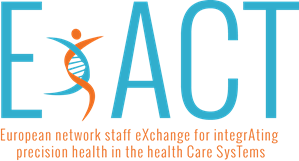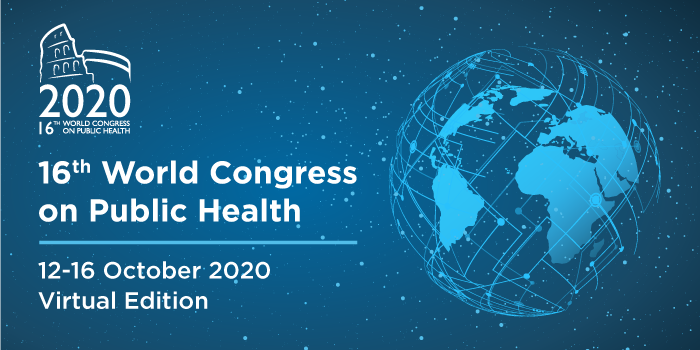| The European Public Health Association Newsletter - August 2020 |
1. EditorialWe hope you have all enjoyed a good and healthy summer break, even in this time of limited travel. In this newsletter, we are happy to update you on the latest in European public health. Wishing you pleasant reading, Iveta Nagyova, EUPHA president and Dineke Zeegers Paget, EUPHA executive director |
2. EUPHA updatePublic health ethics, law and human rights for the future of humanityFREE WEBINAR SERIES
Organised by: UK Faculty of Public Health, EUPHA Section on Ethics in Public Health, EUPHA initiative on Public health and law https://us02web.zoom.us/webinar/register...EUPHAnxt coordinatorThis month we say goodbye to Sara McQuinn, our EUPHAnxt coordinator. She has been leading the next generation network with great enthusiasm, with one of the highlights being a plenary speaker at the European Public Health conference in Marseille in 2019. Thank you Sara for all your hard work and commitment, and good luck with your PhD! EUPHA at the World Congress on Public Health#EUPHAatWCPH2020 ExACT workshop at the World Congress, October 2020
Migration and health in 2019 - track report MarseilleToday EUPHA publishes 'Migration and health in 2019' report. This report summarises the migration and health track from the 12th European Public Health Conference, held 20 till 23 November 2019 in Marseille, France. It reports on key messages from the sessions and discussions in Marseille. https://eupha.org/repository/advocacy/Mi...Appointment to the WHO Technical Advisory Group on Behavioural Insights and Sciences for HealthWe are honoured that our president, Dr. Iveta Nagyova, is ppointed as member of the WHO Technical Advisory Group on Behavioural Insights and Sciences for Health.
Contribute to research project on digital tools for vaccinationIn the context of the EUVIS (EUrope Vaccines ICT Strategies) project, the European Public Health Association (EUPHA) Sections on Digital Health (EUPHA-DH) and Infectious Diseases Control (EUPHA-IDC), are conducting semi-structured interviews aiming to collect best practices on the use and impact of Information and Communication Technologies (ICT) and digital tools to increase vaccine uptake and ultimately vaccination coverage in Europe. We invite those of you interested in the topic to collaborate with us and take part in the interviews.
The interview is semi-structured and self-administered, available at the following link: https://forms.gle/egWTAi55usPRsWg1A (takes approximately 20 minutes)
What did you miss this summer?Highlights of EUPHA's advocacy work over the summer: |

3. European Public Health Conference |
4. EUPHA members updateMembers' annual conferencesThis year's Swiss Public Health Conference will take place 2 and 3 September, online. The theme is: From Evidence to Public Health Policy and Practice. The Bulgarian Public Health Association main annual event will be held 17-19 September 2020 in Pleven. Theme: New methods in public health and health policy. UK's Society for Social Medicine & Population Health 64th Annual Scientific meeting will be held 9-11 September 2020 as a virtual conference. |

5. European Journal of Public HealthVolume 30, Issue 4, August 2020EDITORIALS Henk B M Hilderink
Social determinants of health and inequalities in COVID-19 Bo Burström, Wenjing Tao
VIEWPOINTS
Is lack of causal evidence linking socioeconomic position with health an ‘inconvenient truth’? Olle Lundberg
What should we think about widening relative inequalities in health? Alastair H. Leyland
Health inequalities: the role of work and employment Johannes Siegrist Economic and social context needs to be taken into account Ramune Kalediene Re-thinking health inequalities is necessary Johan P Mackenbach
EU health law and policy in and after the COVID-19 crisis Scott Greer, Anniek de Ruijter
Will COVID-19 lead to a major change of the EU Public Health mandate? A renewed approach to EU’s role is needed Timo Clemens, Helmut Brand
The EU and the social determinants of health in a post-COVID world https://academic.oup.com/eurpub/issue/30... |
6. Call for proposals, job opportunitiesTenure track assistant Professor or assistant Professor in health systems and services researchThe University of Lausanne/Switzerland & Unisante, Institute for Primary Care and Public Health in Lausanne/Switzerland, more specific.ally the Department of epidemiology and health systems (80-100%) Tenure track assistant Professor or associate Professor in health systems and services research within the Department of epidemiology and health systemsThe Faculty of biology and medicine of the University of Lausanne in Switzerland invite applications for the position of https://eupha.org/repository/EUPHA_newsl... COPERS survey - The University of Applied Sciences Emden / LeerThe COVID-19 COPERS study is a longitudinal study investigating the effects the COVID-19 pandemic has on feelings, experiences and resilience of people living in Europe. Participation is currently possible in following languages: English, German, Bulgarian, Romanian and Serbian. COCARE survey - The University of Applied Sciences Emden / LeerThe COVID-19 COCare study is a longitudinal study investigating the effects of the COVID-19 pandemic on resilience trajectories of people professionally caring for people 60+ in Europe. The survey is available in following languages: English, Croatian, Danish, Dutch, German, Italian, Maltese and Serbian. Tell your story: COVID-19 fake newsNo community has felt the tide of fake news on social media as acutely as those fighting Covid-19 on the frontlines. Italo Lennon, an epidemiologist in Brazil has said “Our biggest problem is fake news”. Digital Action wants to ensure the experience and concerns of the medical community are heard. Therefore, they have collaborated with organisations such as the Royal Society for Public Health to ensure individual medics have a space to share their story via a short survey. Digital Action would be interested in hearing if this project would be of interest to EUPHA members, and if you would be interested in collaborating with them to tackle Covid-19 fake news, including by filling in their survey and distributing it with your networks. If this is of interest or you would like more information, you can email survey@digitalaction.co |
7. Interesting newsRace and MedicineThe NEJM selection of articles on race and medicine, with implications for improving patient care, professional training, research, and public health. https://www.nejm.org/race-and-medicineQuestionnaire about Corona virus and its effectsThe Mid Sweden University, together with other countries (e.g. England) have developed an anonymous questionnaire about Corona virus and its effects. The idea is to examine how people feel in various aspects in face of the pandemic. With the data we may be able to suggest som ways to deal with the pandemic. Please read the information and answer the questionnaire if you find it useful. https://www.intcovid.com/The National Collaborating Centre for Methods and Tools (NCCMT) updated Learning CentreThe National Collaborating Centre for Methods and Tools (NCCMT) is pleased to announce our recently updated Learning Centre. The Learning Centre houses the Online Skills Assessment, Online Learning Modules, and the 6S Search Pyramid. We have updated these resources with a fresh new look and select modules have also been updated with new practice articles and examples Young kids could spread COVID-19 as much as older children and adults, study suggestsResearchers have discovered that children younger than 5 years with mild to moderate COVID-19 have much higher levels of genetic material for the virus in the nose compared to older children and adults. The findings point to the possibility that the youngest children transmit the virus as much as other age groups. https://www.sciencedaily.com/releases/20...How the pandemic might play out in 2021 and beyondNature | News feature | August 5, 2020 https://www.nature.com/articles/d41586-0... Social distancing varies by income in United StatesWealthier communities went from being the most mobile before the COVID-19 pandemic to the least mobile, while poorer areas have gone from the least mobile to the most mobile, according to a new study. https://www.sciencedaily.com/releases/20...How to protect yourself in the infodemicCheck the video and see how young people seize opportunities provided by an unprecedented access to information and digital technologies to communicate, share information and contribute to the COVID-19 response. |
8. Upcoming courses and conferences
|
9. Interesting publicationsWHO Guidance for conducting a country COVID-19 intra-action review (IAR)The WHO Guidance for Conducting a Country COVID-19 Intra-Action Review (IAR) was developed to guide countries to conduct periodic review(s) of their national and subnational COVID-19 response, so countries do not miss critical opportunities for learning and improvement to better respond to the COVID-19 outbreak in their countries. The IAR is a country-led facilitated process conducted during the COVID-19 outbreak in-country, bringing together a small group of COVID-19 responders with knowledge of the public health response pillars under review. Although IARs can be conducted online or face-to-face, the online format is recommended, especially if community transmission remains high in the country. The IAR will identify practical areas for immediate remediation and sustained improvement of the ongoing response. https://www.who.int/publications/i/item/...Child and adolescent health needs attention now, and in the aftermath of the COVID-19 pandemicDanielle Jansen, Silja Kosola, Lourdes Cantarero Arevalo, Margarida Gaspar de Matos, Karin Boode, Sonia Saxena & Julia Dratva https://link.springer.com/article/10.100...Digital tools against COVID-19: taxonomy, ethical challenges and navigation aidThe Lancet Digital Health |Health Policy| Volume 2, ISSUE 8, e425-e434, August 01, 2020 Implementation of health and health-related sustainable development goals: progress, challenges and opportunities - a systematic literature reviewThe BMJ Global Health | Original Research | August 26, 2020 Changes in sedentary behaviour in European Union adults between 2002 and 2017BMC Public Health | Research article | 26 August, 2020 Final report EMRaDi project (Rare Diseases in the Euregio Meuse-Rhine)The final report of the EMRaDi project (Rare Diseases in the Euregio Meuse-Rhine) is now available online. The final report includes a summary of the activities, results and specific recommendations for the different target groups (rare disease patients and their relatives, patient organisations, hospitals and healthcare providers, health insurance funds, policy makers). Furthermore, several fact sheets are published, including containing EMRaDi's three main recommendations for political authorities and institutional players. https://www.emradi.eu/en/project-activit...Child and adolescent health needs attention now, and in the aftermath of the COVID-19 pandemichttps://link.springer.com/content/pdf/10...Management of post-acute covid-19 in primary carehttps://www.bmj.com/content/370/bmj.m302...Achieving Person-Centred Health Systems: Evidence, Strategies and ChallengesThe idea of person-centred health systems is widely advocated in political and policy declarations to better address health system challenges. A person-centred approach is promoted on political, ethical and instrumental grounds and believed to benefit service users, health professionals and the health system more broadly. There is continuing debate, however, about available and effective strategies to promote and implement ‘person-centred’ approaches. Mental health, men and culture: how do sociocultural constructions of masculinities relate to men's mental health help-seeking behaviour in the WHO European Region?Men are less likely than women to seek help for mental health issues and are much more likely to commit suicide. This scoping review examined recent evidence published in English and Russian on the role of socially constructed masculinity norms in men’s help-seeking behaviour for mental health issues. https://www.euro.who.int/en/publications...What is the current alcohol labelling practice in the WHO European Region and what are barriers and facilitators to development and implementation of alcohol labelling policy?The WHO European Region has the highest levels of alcohol consumption per capita in the world, yet alcohol labelling, a WHO-recommended practice that provides consumer information on the ingredients, nutritional values and harms of alcohol, is not mandatory. This report synthesizes evidence on alcohol labelling practices in the Region and aims to describe factors affecting implementation. https://www.euro.who.int/en/health-topic... |
10. European Commission newsEuropean Commission Health Newsletter July 2020 - COVID-19 updatesCommission concludes talks to secure future coronavirus vaccine for Europeans Coronavirus: Commission concludes talks to secure future coronavirus vaccine for EuropeansThe European Commission has concluded exploratory talks with a pharmaceutical company to purchase a potential vaccine against COVID-19. The envisaged contract with Sanofi-GSK* would provide for an option for all EU Member States to purchase the vaccine. It is envisaged that, once a vaccine has proven to be safe and effective against COVID-19, the Commission would have a contractual framework in place for the purchase of 300 million doses, on behalf of all EU Member States. The Commission continues intensive discussions with other vaccine manufacturers. https://ec.europa.eu/commission/presscor...European Commission authorises first treatment against COVID-19On 29 July, the European Commission signed a contract with the pharmaceutical company Gilead to secure treatment doses of Veklury, the brand name for Remdesivir, which was the first medicine authorised at EU level for treatment of COVID-19. https://ec.europa.eu/commission/presscor...Coronavirus: Commission approves funding for training of healthcare professionals in intensive care skillsOn 18 August, the Commission signed a contract to make the funding of €2.5 million from the Emergency Support Instrument available for training of a multidisciplinary pool of healthcare professionals supporting and assisting Intensive Care Units (ICU) in times of need due to the COVID-19 pandemic. The training will provide intensive care medical skills to healthcare professionals not regularly working in ICUs. This will help increase the capacity of staff that could be deployed at a time when there is need for rapid, temporary and significant scale-up of ICU capacity. https://ec.europa.eu/commission/presscor...Coronavirus: EU supports vaccine research with additional €100 millionThe Coalition for Epidemic Preparedness Innovations (CEPI), a global partnership created in 2017 to develop vaccines to prevent future epidemics, has launched a call to support the rapid development and global manufacture of COVID-19 vaccines. The EU will co-fund the call with €100 million. https://ec.europa.eu/programmes/horizon2...On 26 August, the first contract the European Commission has negotiated on behalf of the EU Member States with a pharmaceutical company entered into force following the formal signature between AstraZeneca and the Commission. The contract will allow the purchase of a vaccine against COVID-19 for all the Member States of the EU as well as the donation to lower and middle income countries or the re-direction to other European countries. https://ec.europa.eu/commission/presscor...Coronavirus: the Commission signs first contract for vaccineOn 26 August, the first contract the European Commission has negotiated on behalf of the EU Member States with a pharmaceutical company entered into force following the formal signature between AstraZeneca and the Commission. The contract will allow the purchase of a vaccine against COVID-19 for all the Member States of the EU as well as the donation to lower and middle income countries or the re-direction to other European countries. https://ec.europa.eu/commission/presscor... |
11. European Centre for Disease Prevention and Control newsEurosurveillance - Volume 25, Issue 33, 20 August 2020Outbreaks Author's correction
Authors’ correction for Euro Surveill. 2020;25(32) https://www.eurosurveillance.org/content... Eurosurveillance - Volume 25, Issue 31, 06 August 2020Rapid communication Eurosurveillance - Volume 25, Issue 32, 13 August 2020Rapid communication Expression of concern for Euro Surveill. 2020;25(33)"Regarding the article "Accounting for indirect protection in the benefit–risk ratio estimation of rotavirus vaccination in children under the age of 5 years, France, 2018" by Escolano et al, published on 20 August 2020, Eurosurveillance has been informed of a computational error that has occurred in the calculation of indirect benefit. The authors are in the process of recalculating the affected results. Eurosurveillance - Volume 25, Issue 34, 27 August 2020Editorial |
12. WHO newsRisk of #COVID19 resurgence is never far away, but now we know how to target the virus instead of targeting societyStatement to the press by Dr Hans Henri P. Kluge, WHO Regional Director for Europe
WHO/Europe to establish a mental health coalition to support system reforms and COVID-19 recoveryWHO/Europe’s new flagship initiative on mental health is launched. Mental health is a key public health concern in the WHO European Region – over 110 million people are living with some kind of mental health condition, accounting for over 10% of the population. Announcing the Pan-European Commission on Health and Sustainable Development: Rethinking Policy Priorities in the light of PandemicsThe WHO Regional Office for Europe is convening a Pan-European Commission on Health and Sustainable Development to rethink policy priorities in the light of pandemics. https://www.euro.who.int/en/media-centre... |
|
This newsletter received co-funding under an operating grant from the European Union’s Health Programme (2014-2020). The content of this newsletter represents the views of the author(s) only and is his/her sole responsibility; it cannot be considered to reflect the views of the European Commission and/or the Consumers, Health, Agriculture and Food Executive Agency or any other body of the European Union. The European Commission and the Agency do not accept any responsibility for use that may be made of the information it contains. |
|
Unsubscribe If you would like unsubscribe from the EUPHA newsletter then please click here. |


